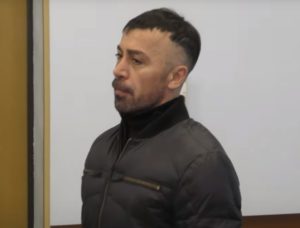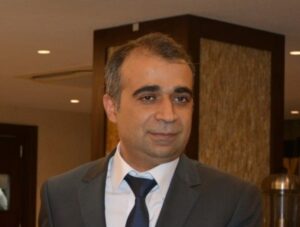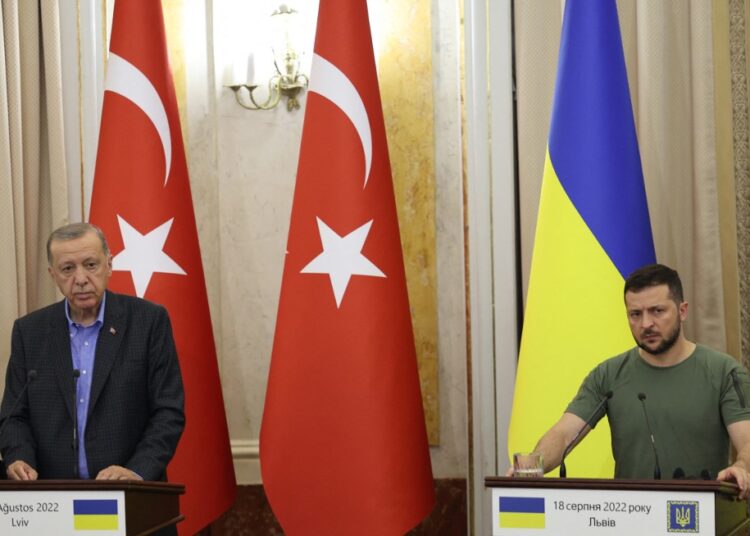Abdullah Bozkurt/Stockholm
A former military officer and arms smuggler who was secretly transported by Ukrainian intelligence to Turkey in a coffin was allegedly tortured for nearly a month at a black site run by Turkish intelligence agency MIT.
According to court documents obtained by Nordic Monitor, Nuri Gökhan Bozkır, who was wanted by Turkey for his alleged involvement in the murder of an academic, was illegally transferred to Turkey by a secret unit of Ukrainian intelligence in a coffin despite the fact that extradition proceedings in Ukrainian courts were still pending.
The transfer is believed to have been the result of secret bargaining by Turkish and Ukrainian officials after intensive lobbying by Turkish leader Recep Tayyip Erdogan at the presidential level.
The details of his transfer were revealed by Bozkır on February 14, 2023 during his subsequent trial. He said when he was blindfolded and put in a coffin by the Ukrainian intelligence unit, he was told that this was how the Turkish government wanted him transported.
An aircraft operated by Ukrainian intelligence flew to Esenboğa Airport in Ankara on January 2, 2022, and Bozkır was handed over to Turkish intelligence agents who brought an armored truck to pick him up. He said Ukrainian officials repeatedly apologized to him, saying the method of transport was not their choice but rather that of the Turkish side.
Transcript of a court hearing which showed how Ukrainian intelligence transported the arms smuggler in a coffin to Turkey:
His entry to Turkey was never officially registered, and immigration records still show him as living abroad since September 12, 2015, when he fled to Ukraine to escape a criminal case for illegally transporting arms to jihadist groups in Syria in cooperation with Turkish intelligence. When prosecutors discovered his involvement in intercepted Syria-bound trucks that were loaded with explosive ordnance, MIT told him to stay away from Turkey until they sorted out legal problems in the case.
However, years later the tables were turned, and the Turkish government decided to make him the fall guy in the murder of Necip Hablemitoğlu, a neo-nationalist academic who was killed on December 18, 2002 in front of his apartment building in Ankara. The murder was perpetrated by a unit of the Combat Search and Rescue (MAK), an elite force attached to the military’s Special Forces Command (ÖKK), of which Bozkır was a member.
In 2015 Bozkır was initially offered a deal by Turkish authorities in which he would be a secret witness for the prosecutor and falsely accuse government critics of the academic’s murder. But things did not work out the way he thought, and he found himself accused of involvement in the murder.
After he was handed over to MIT agents in Ankara, Bozkır said he was taken to a black site near Esenboğa Airport. The site is run by Turkish intelligence for the purpose of unlawfully detaining and interrogating people who were kidnapped, abducted or rendered to Turkey. Several victims have testified in recent years identifying the location where they were held incommunicado and subjected to torture for days, weeks and in some cases months.

Bozkır claimed he was subjected to abuse and torture for 25 days at this site. He was placed in a tightly confined box, regularly beaten, forced to stay in a stress position for hours, sexually harassed and made to crawl like a dog. For the first 10 days, he said he was injected with an unknown substance to make him lucid and that he didn’t remember those days very well. At one point, his torturers were worried that he was dead because he passed out and had difficulty waking up.
He lost weight and had dropped to 50 kilos (110 pounds) by the time MIT agents handed Bozkır over to the police on January 27, 2022 for detention and formal processing in the criminal justice system. Before his transfer to the police, he was threatened with the death of his 12-year-old son if he made allegations against MIT and revealed the involvement of a MIT agent in the murder of Hablemitoğlu.
Through his lawyers, Bozkır filed a complaint from prison with the prosecutor’s office and demanded his torturers be punished, but the prosecutor ignored the 25-day unlawful detention by MIT and instead said he was well treated in police custody and decided that there was no need to pursue an investigation or prosecution.
During the hearings, his lawyers also appealed to the judges to direct the prosecutor’s office to look into the allegations of torture while Bozkır was in MIT custody, but presiding judge Mehmet Selim Karakuzu, handpicked by the government to steer the Hablemitoğlu case for its political benefit, said he did not believe the claims of torture perpetrated by MIT. Bozkır said evidence of the torture was still visible on his body and that he was ready to show it to the judges to prove his claims.

Bozkır enriched himself through shady business deals after he was dismissed from the military, when he was incriminated in an extortion case back in 2005. He profited from illegal arms trafficking after the Syrian crisis erupted in 2011, owned villas in Ukraine and Italy and ran front businesses such as restaurants and other outfits.
Married to a Ukrainian woman, he had built a life for himself in Kyiv. He always used armored cars and was escorted by four bodyguards when traveling. He was visited by MIT agents including Abdurrahman Simsek, who works under the cover of journalism at Turkey’s Sabah daily, a media outlet owned by Erdogan’s family. In 2018, when Erdogan visited Ukraine and met with Turkish businesspeople at the Turkish embassy, Bozkır was one of the invited guests. Erdogan personally expressed his appreciation for the work done by Bozkır in Ukraine.
He also helped the Erdogan government in a witch hunt pursued against members of the Gülen movement, a group that is opposed to Erdogan and critical of his regime for pervasive corruption in the government and Turkey’s aiding and abetting of armed jihadist groups. He said he had informed Turkish authorities about members of the Turkish Armed Forces who he claimed had links to the movement so they could be purged.
In his testimony, Bozkır claimed he was close to Ukrainian president Volodymyr Zelensky and his predecessor and knew the head of Ukrainian intelligence. He even offered to hunt down Gülenists in Ukraine using his friendship with the Ukrainian intelligence chief, with whom he had dined in his restaurant in Kyiv. He said he had documentary evidence, chat messages and communication records to back up his allegations and was ready to submit them to the court if needed.
Partial transcript of a court hearing which confirms that Ukrainian intelligence transported an arms smuggler to Turkey in a coffin:
Although he had worked with Turkish intelligence in arms trafficking to Syria, the Erdogan government decided to sacrifice Bozkır in the Hablemitoğlu murder cold case. Turkey submitted an extradition request to Ukraine, and he was detained on July 9, 2019 by Ukrainian police on the outstanding arrest warrant issued by Turkey. He was released six months later into house arrest pending extradition proceedings. He started revealing dirt on the Erdogan government, sharing video footage of arms he had helped procure for jihadists and told Ukrainian media how the arms transfer to Syria took place.
A furious Erdogan personally appealed to his Ukrainian counterpart during presidential visits to Ukraine to turn him over and eventually convinced them to make that happen in January 2022. Ukrainian intelligence turned him over after a secret flight despite the fact that legal proceedings for his extradition were still pending. Although he was being tortured while in MIT’s illegal custody, Erdogan publicly announced his return to Turkey three days after he arrived and praised Turkish intelligence for the operation. However, he was nowhere to be found when family members and lawyers inquired with authorities, until January 27, when MIT dropped him in a remote location and informed the police to pick him up.

The reopened murder case, which had remained unsolved for decades, serves as leverage for President Erdogan against the neo-nationalists, with whom he had forged an alliance in 2014. The masterminds of the murder are believed to be anti-Western neo-nationalists who were linked to İnan Kıraç, a billionaire businessman dubbed the “Lord of Darkness” in organized crime circles.
In exchange for saving himself and his family members from corruption probes that were made public in December 2013, Erdogan granted amnesty to convicted neo-nationalists because he needed their associates to run the country and fill vacant positions left by a mass purge of civil servants in the judiciary, police and intelligence agency as well as members of the military.
Neither Kıraç nor neo-nationalist generals who sanctioned the murder were named as suspects in the indictment, which indicates that the secret bargain between Erdogan’s Islamist bloc and the neo-nationalists is still holding. The billionaire’s name and others may come up again in the future if the deal between Erdogan and the neo-nationalists is shattered.












